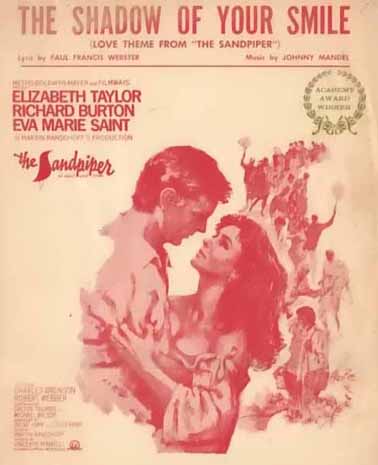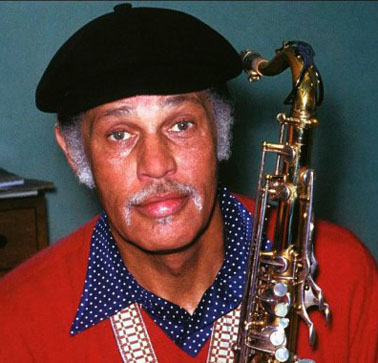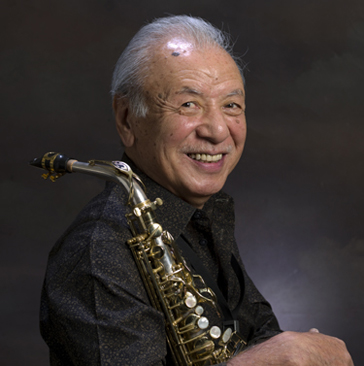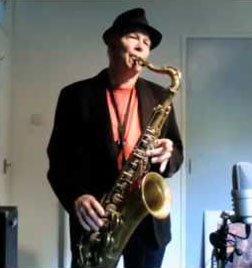Happy saxophone holidays to the shadow of your smile (and other close-to-year-end notes), 1965—2015
Dec 10th, 2015 | By Dominic Berry | Category: In Brief

Toronto artist Michael Seward shows not even a shadow of a smile as he contemplates the 2015 holidays in his living room.
“The Shadow of Your Smile” was one of the last enduring popular songs in the tradition of the Great American Songbook – whose truest heyday was “from the 1920s to the 1950s.”
With music by Johnny Mandel and lyrics by Paul Francis Webster, it first appeared in 1965, as the Academy Award winning Best Original Song in a movie called The Sandpiper, featuring the dynamic duo of Elizabeth Taylor and Richard Burton.
The opening credits to The Sandpiper are accompanied by a strictly instrumental version of the tune, featuring the trumpet player Jack Sheldon. (Along with some breathtaking aerial photography of Big Sur on the Central Coast of California.)
According to Andrew Unterberger’s Every Oscar Winner for Best Original Song, Ranked, the full movie soundtrack version was “Performed By: Johnny Mandel & Choir.” And there is a short clip from the soundtrack on YouTube that presents the original choir performance of this “short and sweet and maybe even the slightest bit sinister” great American song (Unterberger).
I have seen various parts of The Sandpiper myself – but always on TV, and I don’t think I’ve ever watched the entire movie from beginning to end. Â I don’t recall seeing it in a theatre when it first came out in 1965.
 But 1965 was the golden year I turned 20. I was a young guy at college, and I do have some strong memories of “The Shadow of Your Smile” from the first time I heard it on the radio.
But 1965 was the golden year I turned 20. I was a young guy at college, and I do have some strong memories of “The Shadow of Your Smile” from the first time I heard it on the radio.
In the summer of 1966, to take just one case in point, I was lucky enough to get a job at “Ford’s” Â in Windsor, Ontario, just across the river from Detroit. And I remember going to a bar with friends from work one night, and hearing a middle-age guy on alto sax give an unusually soulful rendition of “The Shadow of Your Smile.”
For some reason I have a similar memory from the mid 1970s. Â I’m at a kind of retro bar and dance place back in the old hogtown with my wife. And another middle-age alto sax guy (this time sporting a crazy wig) is playing another soulful variation on the theme.
Back in 1966 a youthful Tony Bennett vocal recording of “The Shadow of Your Smile” won the Grammy Song of the Year Award.
From the beginning, however, the line of Johnny Mandel’s music, and its “slightest bit sinister” (but also almost pretty) chord changes, have appealed to many different saxophone players. The pioneer here was Eddie Harris, who put a high-register easy listening tenor sax version as the first number on his 1965 Atlantic records album, The In Sound.
For some additional reason, I have lately been playing “The Shadow of Your Smile” in my own basement lung exercises with a King Super 20 Silver Bell tenor, purchased in the late 1970s (and overhauled in the early 21st century). In its Real Book concert key of G (er E minor more exactly, maybe? – A or F# minor on the Bb tenor – though the song does end on a G6/A6 major chord) it makes good low-register practice, if you don’t read up an octave.
This has finally led to my searching YouTube for other saxophone versions of the tune, as inspiration.

Diana Theodora Suciu ... in love with saxophones (or just Adolphe Sax?) ... and The Shadow of Your Smile ...
Moving from high to low, the top 8 include : two alto sax versions (the Romanian lady Diana Theodora Suciu, and the Japanese star Sadao Watanabe), five tenor variations (Dexter Gordon, Boots Randolph, Ian Boyter, Matthew Stone, and José Carlos Simões) ; and one final intriguing concoction from the late, great Gerry Mulligan on baritone.
Those wild and crazy enough to want to explore the subject further (along with very short notes on old and new rebels against the Canadian crown, Senate reform in Canada, new seats in the Ontario legislature, and the prize-winning Toronto artist Michael Seward) can click on “Read the rest of this page” and/or scroll below.
1. Top 8 Saxophones on The Shadow of Your Smile
* Diana Theodora Suciu, alto – talented young lady on Romanian TV.
* Sadao Watanabe, alto – awarded the Order of the Rising Sun for his contribution to the arts in Japan, “also a citizen of Los Angeles, California, United States.”
* Dexter Gordon, tenor – real jazz take from a late master of the lower register, with local rhythm section in Sweden 1974.
* Boots Randolph, tenor – aspiring real jazz musicians in my youth looked askance at Boots … when I listen to him now he’s more interesting than I thought.
* Ian Boyter, tenor – a guy in his home recording studio : closer to my own scene but still a lot better than I am!
* Matthew Stone, tenor – another guy in his home recording studio : still a lot better than I am.
* Jos̩ Carlos Sim̵es, tenor Рanother master of the lower register, presumably from Brazil with a lot of pop tunes on You Tube.
* Gerry Mulligan, baritone – a big name in my youth but apparently once thought to be a better arranger than a player among his New York peers … a very convincing player here nonetheless.
2. Old and new rebels against the Canadian Crown
Just two quick notes on this front :
* “Dror Bar-Natan renounces allegiance to Queen, spurs Monarchy debate” on CBC Radio’s The Current, December 1, 2015, is worth checking out if you missed it when it aired. Note especially the later interview with Ashok Charles, occasional contributor to this site and executive director of the democratic reform ginger group Republic Now || République du Canada.
* In a related vein see Neil Macdonald’s December 5, 2015 piece “Do we still need throne speeches that date from the age of thrones? … If we want ‘real change,’ as someone is promising, maybe we [should?] rethink some of our slavish traditions,” on the CBC News site.
3. PM Trudeau’s Senate relief strategy is not Senate reform in Canada

Dexter Gordon (Los Ãngeles, California, 27 de febrero de 1923 — Filadelfia, 25 de abril de 1990), saxofonista (tenor) estadounidense de jazz, estilista del bop y del hard bop.
I know nothing about Canadian Senate reform – beyond the starting point that the institution as it is right now is largely a joke.
But I bumped into our local guru on the subject, Randall White, at the Longhouse Tavern the other night. And he said that PM Trudeau’s new advisory panel for Senate appointments “may be temporary relief for the new Liberal government’s potential logistical problems in the Senate, but it’s not real Senate reform.”
Or, he went on, BC Premier Clark is essentially right. (See “Christy Clark says Trudeau legitimizing unaccountable Senate, BC under-representation.”)
For a few further details see : “Ministers name advisory panel to end ‘partisan nature’ of Senate” ; Â “Liberals name George Furey Senate Speaker, replacing Conservative Leo Housakos” ; and “Liberals announce new ‘merit-based’ Senate selection process.”
4. 15 more seats in the Ontario legislature for 2018
Taking something of a leaf out of Mike Harris’s old book (in some respects at any rate), Ms Wynne’s “Ontario government” has announced that it is “adjusting  the province’s electoral map to bring it in line with the one used for federal elections.”
See “Ontario’s Liberal government adds 15 new ridings, second coming to Barrie.” Which makes you wonder. Is the thought that many of the new provincial seats will go Liberal – as in the recent federal election? How many more gifts can Liberals across the country expect from Stephen Harper?
5. Portrait of the artist as a not so young man … latest Michael Seward rumours
I want to thank Marie Auffrey for the photos of Toronto artist Michael Seward and his painting of the old Upper Canada rebellion leader William Lyon Mackenzie used above.
As some visitors to this site may already know, Mr. Seward is the recipient of the first counterweights online art prize – in commemoration of the 800th anniversary of the signing of the Magna Carta at Runnymede and the recent death of the jazz artist Ornette Coleman in Manhattan.
I still more recently heard a rumour that Michael Seward is also the current front runner in the race for the second annual prize.
Finally, several days ago several Canadians in the Toronto area celebrated the 178th anniversary of the ill-fated march from Montgomery’s Tavern down Yonge Street, on December 5, 1837, in William Lyon Mackenzie’s failed Upper Canada rebellion,.
6. Happy holiday … by Irving Berlin in 1941 … and Percy Faith in 1966
On a final return to the Great American Songbook, “‘Happy Holiday’ (sometimes performed as ‘Happy Holidays’) is a popular song composed by Irving Berlin during 1941 and published the following year” – when it “was introduced by Bing Crosby in the 1942 film Holiday Inn.”
As Wikipedia also explains : “The song helped to popularize the phrase ‘Happy holidays’ as a common greeting during the Christmas and holiday season in the United States” (and of course in Canada too!).
My favourite version of this tune dates back to the middle of the 1960s as well, when I was young and even more foolish than my wife will tell you I certainly still am now. It was arranged by the Canadian orchestrator Percy Faith, and appeared on his popular 1966 album Christmas Is.
I finally end here by quoting the repeating first and last stanzas : “Happy holiday, happy holiday / While the merry bells keep ringing / May your every wish come true / Happy holiday, happy holiday / May the calendar keep bringing / Happy holidays to you.”







